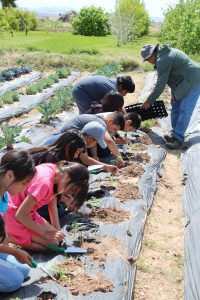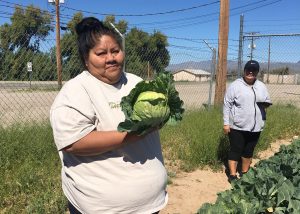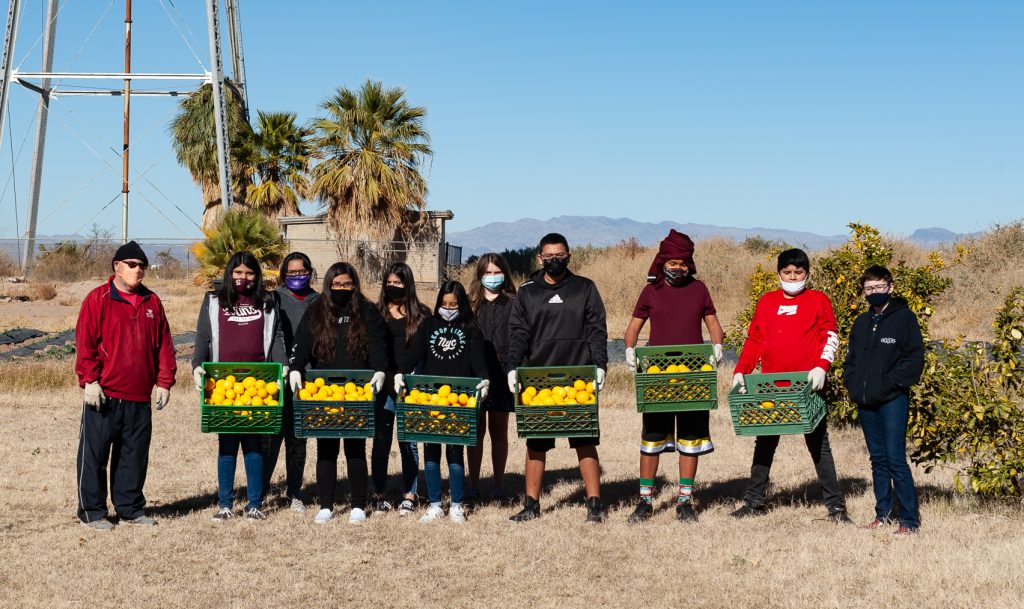The Colorado River Indian Tribes (CRIT) is comprised of four distinct tribes: The Mohave, Chemehuevi, Hopi and Navajo. The CRIT reservation was established in 1865 and is located on the Southwestern part of Arizona along the Colorado River, with a portion of the reservation on the California side. The reservation covers an area of close to 300,000 acres, 80,000 of which is arable. The main agricultural products are alfalfa and cotton, and a few minor crops which includes specialty potatoes, durum wheat, sorghum, as well as Bermuda and Sudan grass.
Activities
FRTEP is the outreach arm of the University of Arizona Cooperative Extension for the Colorado River Indian Tribes. The FRTEP agent, together with the extension specialists and faculty, provides science-based information and programs to help the farmers, youth and the tribal community.
Highlights
MEASURING IMPACT
-
“I love the 4-H program and the opportunities it provides for children to start learning about accountability and responsibility and being a good role model.
-
“I do farming here on the reservation… and I see [Extension] is a pretty valuable asset as far as 4-H and [adult] continuing education…it connects the dots in my life….there’s good, useful resources here.”
FRTEP programs have had a major impact on individuals, families and tribal communities. Just how much impact has now been quantified thanks to a research project that used Ripple Effects Mapping (REM) and content analysis. The Indian Land Tenure Foundation (ILTF) engaged in a joint collaboration with an evaluation team and the Western Extension Risk Management Education Center to measure the long-term impacts of the Federally Recognized Tribal Extension Program (FRTEP) serving the Colorado River Indian Tribes. Click the link below to read the report.
Agriculture and Natural Resources
FRTEP aims to help farmers in the reservation improve productivity by providing educational opportunities on crop production technologies, and pest and disease management. The FRTEP agent collaborated with the extension specialists of the University of Arizona Cooperative Extension to share results of their latest research studies and other developments in crop production. Weather forecasts and heat units data are provided to help farmers manage their crops better. Field trials are also conducted to generate local data.
 School Garden
School Garden
The CRIT reservation is blessed with a fertile valley and an abundance of water, resources which support farming. FRTEP collaborated with Le Pera Elementary School (the K-8 school located on the reservation) to establish a learning garden so students will understand how plants grow and have an appreciation of the farming activities around them. The garden provides an opportunity for students to learn hands-on how to grow vegetables and take care of fruit trees. It serves as an outdoor classroom where students learn applied science and math concepts through gardening. The school garden is divided into two sections: a vegetable area and a fruit grove. In the vegetable area, students do land preparation, planting and learning what plants are suitable for the cold and warm seasons, irrigation and water conservation using a drip system and mulching, care and maintenance, and harvesting. In the fruit grove, the students learn how to fertilize, prune, and remove weeds under the canopy of trees. The garden also offers physical activity for the students and gives them a break from sitting inside the classroom for long hours.

Community Garden
FRTEP has partnered with the CRIT-DHS Food Distribution Program on a community garden project to encourage clients to grow vegetables. The garden provides a season-long learning opportunity that enables participants to learn gardening from preparing the soil to harvesting. Participants are encouraged to grow their own garden at home so they can apply the concepts learned from the community garden. During the COVID-19 pandemic, FRTEP partnered with the AZ Health Zone (formerly SNAP Ed) coordinator to provide the Seed-to-Supper online vegetable gardening program. This is a six-week gardening class that covers topics from planning a home garden to harvesting.
Health and Nutrition
In addition to the community garden project, FRTEP has partnered with the County FCHS agent and the AZ Health Zone program coordinator to provide nutrition education and cooking demonstrations using healthy recipes that utilize ingredients coming from the CRIT-DHS Food Distribution Program and from the community garden.

4-H and Youth Development
The 4-H program provides opportunity for youth to learn life skills and develop leadership and communication skills. FRTEP collaborated with the county 4-H agent to encourage tribal youth to participate in 4-H. Notable projects include livestock, small stock and poultry raising, where they learn to raise animals for food. Participants are required to do an indoor project which helps develop their writing and communication skills. Other projects offered include shooting sports and sport fishing, and a summer camp where students learn about robotics, solar energy, and other STEM concepts. Club membership is required as well as attendance in club meetings. This helps youth to develop leadership skills as they perform different tasks and roles in the club. Youth members are also encouraged to volunteer in community events to further enhance interpersonal skills as well as teaching them the importance of giving back to the community which supports the 4-H program.
FRTEP also partnered with Le Pera Elementary School on a mini Fab Lab project. FRTEP will provide state-of-the-art equipment through a grant funded by the University of Arizona Cooperative Extension. The school will provide the space to house the Fab Lab and develop a curriculum that will provide an opportunity for students to learn STEM concepts and their practical application.
COVID-19 Activities
- Distributed face masks through food banks, soup kitchens and crisis shelters.
- Worked with local 4-H leaders to purchase personal protective equipment (PPE) and cleaning supplies and donated these to other tribal communities affected by the virus.
- Provided hand sanitizers for use in tribal offices.
- Donated produce (watermelons, tomatoes, apples, bell peppers) from various garden projects to tribal employees who are front-line/essential workers.
- Provided vegetable seeds and gardening information to residents to encourage backyard gardening during the stay-at-home order.
- Worked virtually with 4-H youth to complete and collect their record books.
- Provided virtual training for 4-H youth who qualified to become ambassadors and members of state-level committees.
- Provided technical support for gardening webinars.
- Addressed gardening questions sent via e-mails, text messages and social media.
Contact Information
Adonis Alamban – Extension Educator
Phone Number
928-575-6507
apalamban@email.arizona.edu
